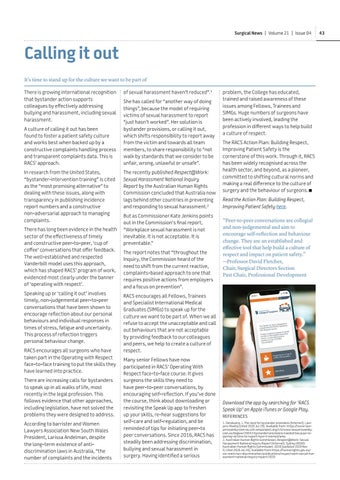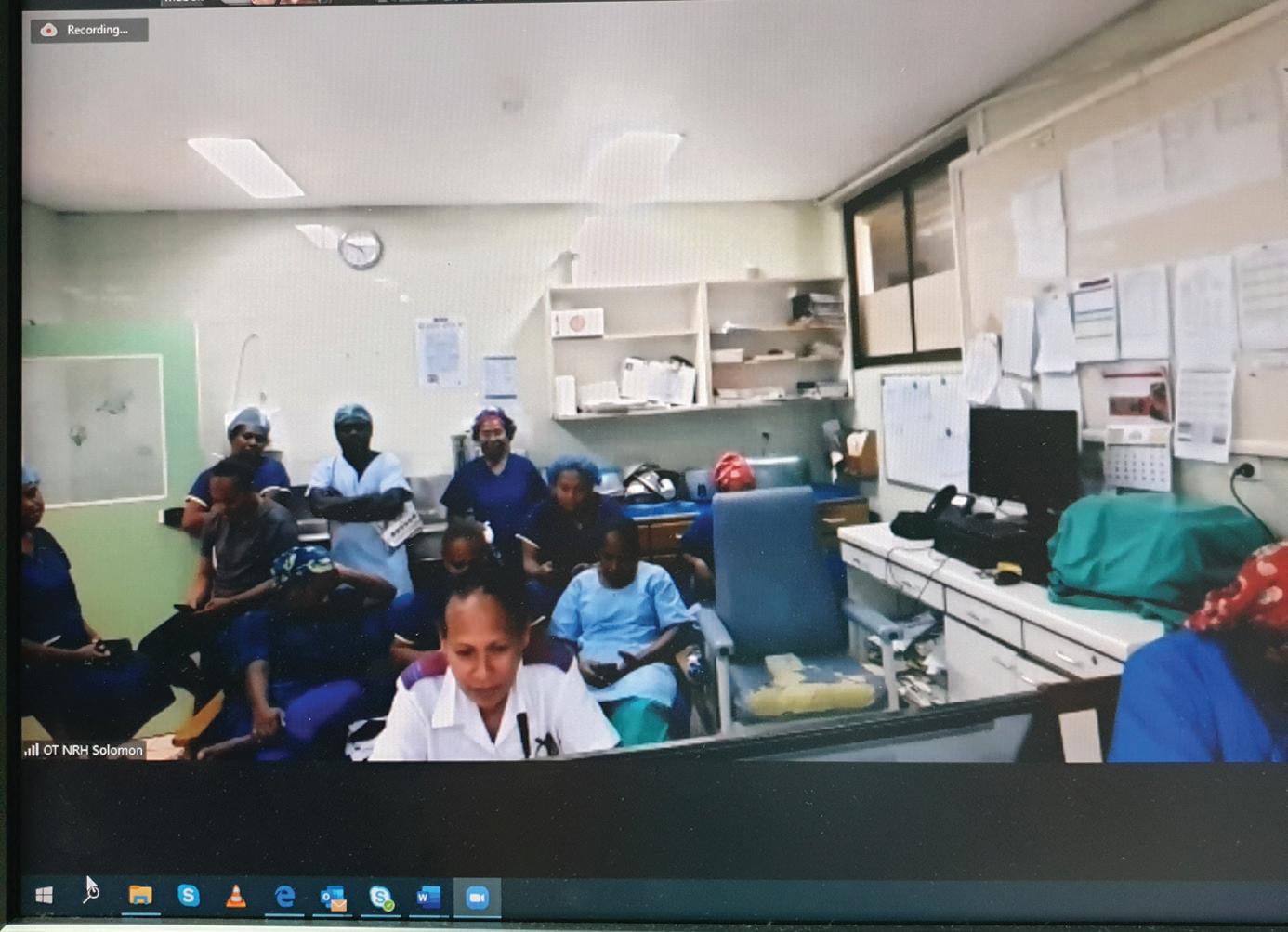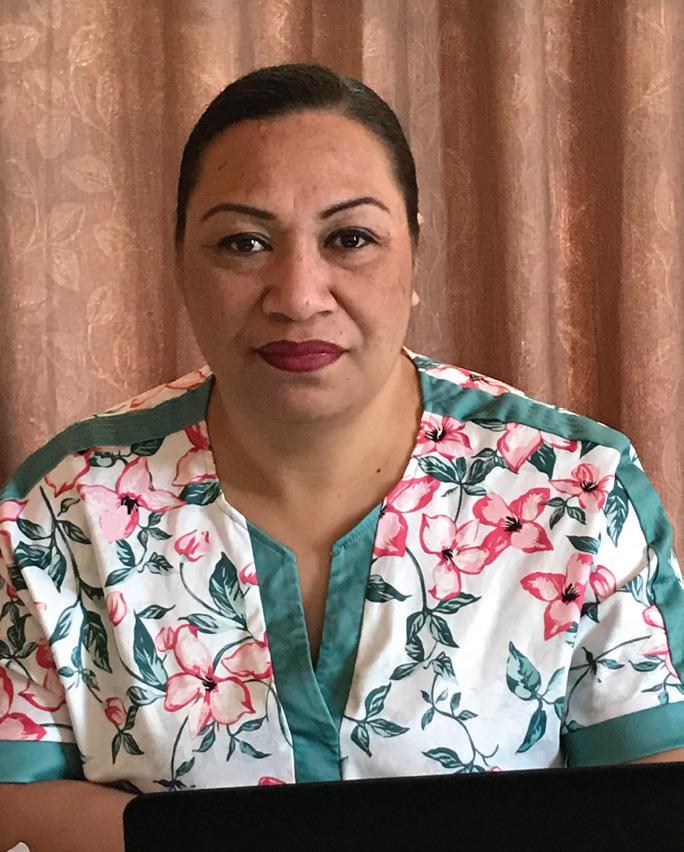Surgical News | Volume 21 | Issue 04
Calling it out It's time to stand up for the culture we want to be part of There is growing international recognition that bystander action supports colleagues by effectively addressing bullying and harassment, including sexual harassment. A culture of calling it out has been found to foster a patient safety culture and works best when backed up by a constructive complaints handling process and transparent complaints data. This is RACS’ approach. In research from the United States, “bystander-intervention training” is cited as the “most promising alternative” to dealing with these issues, along with transparency in publishing incidence report numbers and a constructive non-adversarial approach to managing complaints. There has long been evidence in the health sector of the effectiveness of timely and constructive peer-to-peer, ‘cup of coffee’ conversations that offer feedback. The well-established and respected Vanderbilt model uses this approach, which has shaped RACS’ program of work, evidenced most clearly under the banner of ‘operating with respect’. Speaking up or ‘calling it out’ involves timely, non-judgemental peer-to-peer conversations that have been shown to encourage reflection about our personal behaviours and individual responses in times of stress, fatigue and uncertainty. This process of reflection triggers personal behaviour change. RACS encourages all surgeons who have taken part in the Operating with Respect face-to-face training to put the skills they have learned into practice. There are increasing calls for bystanders to speak up in all walks of life, most recently in the legal profession. This follows evidence that other approaches, including legislation, have not solved the problems they were designed to address. According to barrister and Women Lawyers Association New South Wales President, Larissa Andelman, despite the long-term existence of antidiscrimination laws in Australia, “the number of complaints and the incidents
of sexual harassment haven’t reduced”.1 She has called for “another way of doing things”, because the model of requiring victims of sexual harassment to report “just hasn’t worked”. Her solution is bystander provisions, or calling it out, which shifts responsibility to report away from the victim and towards all team members, to share responsibility to “not walk by standards that we consider to be unfair, wrong, unlawful or unsafe”. The recently published Respect@Work: Sexual Harassment National Inquiry Report by the Australian Human Rights Commission concluded that Australia now lags behind other countries in preventing and responding to sexual harassment.2 But as Commissioner Kate Jenkins points out in the Commission’s final report, “Workplace sexual harassment is not inevitable. It is not acceptable. It is preventable.” The report notes that “throughout the Inquiry, the Commission heard of the need to shift from the current reactive, complaints-based approach to one that requires positive actions from employers and a focus on prevention”.
problem, the College has educated, trained and raised awareness of these issues among Fellows, Trainees and SIMGs. Huge numbers of surgeons have been actively involved, leading the profession in different ways to help build a culture of respect. The RACS Action Plan: Building Respect, Improving Patient Safety is the cornerstone of this work. Through it, RACS has been widely recognised across the health sector, and beyond, as a pioneer, committed to shifting cultural norms and making a real difference to the culture of surgery and the behaviour of surgeons. Read the Action Plan: Building Respect, Improving Patient Safety here. “Peer-to-peer conversations are collegial and non-judgemental and aim to encourage self-reflection and behaviour change. They are an established and effective tool that help build a culture of respect and impact on patient safety.” —Professor David Fletcher, Chair, Surgical Directors Section Past Chair, Professional Development
RACS encourages all Fellows, Trainees and Specialist International Medical Graduates (SIMGs) to speak up for the culture we want to be part of. When we all refuse to accept the unacceptable and call out behaviours that are not acceptable by providing feedback to our colleagues and peers, we help to create a culture of respect. Many senior Fellows have now participated in RACS’ Operating With Respect face-to-face course. It gives surgeons the skills they need to have peer-to-peer conversations, by encouraging self-reflection. If you’ve done the course, think about downloading or revisiting the Speak Up app to freshen up your skills, re-hear suggestions for self-care and self-regulation, and be reminded of tips for initiating peer-to peer conversations. Since 2016, RACS has steadily been addressing discrimination, bullying and sexual harassment in surgery. Having identified a serious
Download the app by searching for ‘RACS Speak Up’ on Apple iTunes or Google Play. REFERENCES
1. Doraisamy, J. The need for bystander provisions [Internet]. Lawyers Weekly [cited 2020 Jul 28]. Available from: https://www-lawyersweekly-com-au.cdn.ampproject.org/c/s/www.lawyersweekly. com.au/biglaw/26043-bystander-provisions-needed-because-requiring-victims-to-report-hasn-t-worked/amp 2. Australian Human Rights Commission. Respect@Work: Sexual Harassment National Inquiry Report [Internet]. Sydney (NSW): Australian Human Rights Commission; 2020 [updated 2020 Nov 5; cited 2020 Jul 28]. Available from:https://humanrights.gov.au/ our-work/sex-discrimination/publications/respectwork-sexual-harassment-national-inquiry-report-2020
43



















